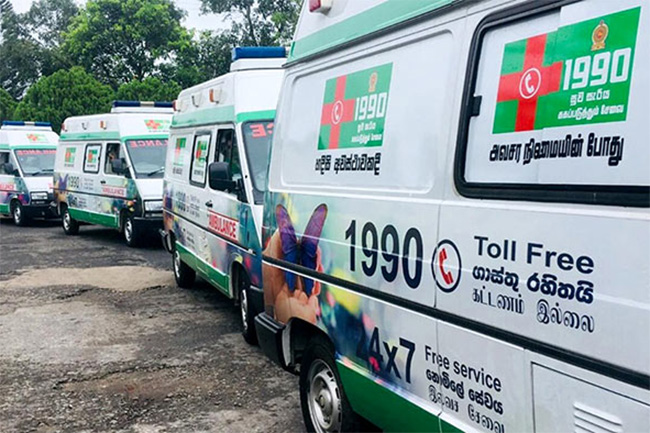World Bank hails ‘Suwa Seriya’ ambulance service for saving countless lives
March 19, 2024 11:13 pm
The World Bank has hailed Sri Lanka’s toll-free ‘1990 Suwa Seriya’ ambulance service for saving countless lives, while providing citizens the highest level of pre-hospital care.
In a blog post, the World Bank’s Vice President for the South Asia Region, Martin Raiser further commended the ambulance service for reducing complications caused by delayed care, and enabling them to get back into the workforce in record time—making a positive contribution to the country’s economy.
“Since its launch in 2016, 1.8 million Sri Lankan citizens in distress have dialed 1990, and a Suwa Seriya ambulance has rushed them to the nearest hospital or primary care facility within 12 minutes of their call, one of the fastest response rates in the world for an ambulance service.”
South Asia is home to many development innovations, including in the delivery of social services through government-private sector-and civil society partnerships, Raiser said, noting that 1990 Suwa Seriya stands in a proud tradition.
The ‘1990 Suwa Seriya’, one of the world’s most digitally advanced and free ambulance services, was established through a dedicated Act of Parliament in 2018. It is a government entity that operates with the agility and independence of a private sector organization, resulting in remarkable efficiency and setting new standards for government-delivered services.
The World Bank’s senior official lauded ‘Suwa Seriya’ for tapping into digitization by leading digital innovation in health and emergency services. “Its trademark speed and efficiency come from digital integration into its processes and operations—from using specific algorithms to identify the fastest (not the nearest) ambulance that can be deployed to an emergency, to tracking callers’ locations through an app, to digitally tracking fuel levels in its vehicles.”
A new ambitious pilot initiative called Connected Ambulance takes digital health to new heights by incorporating Artificial Intelligence and Mixed Reality to allow physicians to treat a patient in real time on board an ambulance. Raiser emphasized that Suwa Seriya’s success is an example of how technology can help revolutionize service delivery in developing countries.
He said ‘Suwa Seriya’ is strengthening Sri Lanka’s primary healthcare system and giving a second chance at life to the millions who are critically injured by filling a critical gap in pre-hospital care and improving connectivity between emergency ambulance service and primary care facilities.
The ambulance service also complements the work done by the World Bank-financed Primary Healthcare Strengthening Project to enhance Sri Lanka’s primary healthcare services, he further commented.
Raiser pointed out that the ambulance service was particularly indispensable during the COVID-19 pandemic, with ‘Suwa Seriya’ transporting close to 175,000 COVID-19 patients to the hospital.
In addition, it has also improved healthcare access in hard-to-reach rural areas such as in Ramya’s case above, ensuring equitable access of emergency services to vulnerable citizens, and reducing overall morbidity and mortality in the country, he continued.
The Vice President is of the view that the growth of ‘Suwa Seriya’ is a testament to homegrown innovation and local funding. “The technology that drives the service was all developed through Sri Lanka’s software development community, underscoring the need for countries to invest in digital skills.”
Initially funded by a grant from India, ‘1990 Suwa Seriya’ has since been supported by the Sri Lankan government. However, it deliberately seeks private donors and sponsors to fund its digital innovations so as to not rely solely on public funding in a resource-constrained environment. In its largest fundraiser yet, ‘Suwa Seriya’ raised an impressive LKR 750 million in private funding via its “adopt an ambulance” campaign.
In conclusion, Raiser said: “South Asia has been hard hit by several shocks in recent years, from devastating natural disasters and economic crises to pandemics and political upheavals. However, initiatives like ‘1990 Suwa Seriya’ show that countries can be resilient and innovative even during crises, displaying homegrown creative solutioning at its best and how it can be replicated and expanded to create widespread benefits for the entire population.”












